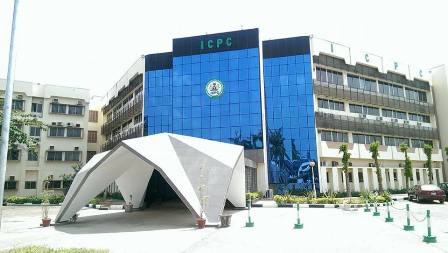Business
N2.67bn School Feeding Funds Found In Private Accounts, ICPC Confirms …Ministry Feigns Ignorance

The Chairman, Independent Corrupt Practices and other Related Offences Commission (ICPC), Prof. Bolaji Owasanoye, says the agency has discovered N2.67billion meant for the school feeding programme in private accounts.
The agency, he added, also found over N2.5billion diverted by a deceased worker with the ministry of agriculture, noting that 18 buildings, 12 business premises and 25 plots of land, were also recovered in the ministry.
Owasanoye disclosed this in Abuja on Monday at the second National Summit on Diminishing Corruption in the Public Sector, which was organised in collaboration with the Office of the Secretary of the Government of the Federation.
The summit with the theme, “Together against corruption”, also included the launch of the National Ethics and Integrity Policy.
He said under the Open Treasury Portal review carried out between January and August 15, 2020, 72 out of 268 ministries, departments and agencies had cumulative infractions of N90million.
According to him, while 33 MDAs explained that N4.1billion was transferred to sub-Treasury Single Account, N4.2billion paid to individuals had no satisfactory explanations.
He stated, “We observed that transfers to sub-TSA were to prevent disbursement from being monitored. Nevertheless, we discovered payments to some federal colleges for school feeding in the sum of N2.67billion during lockdown when the children are not in school, and some of the money ended up in personal accounts.”
The ICPC chairman also said under its 2020 constituency and executive projects tracking initiative, 722 projects with a threshold of N100million (490 ZIP and 232 executive) were tracked across 16 states.
He noted that the constituency tracking project of the agency compelled 59 contractors to return to sites, adding that the individuals handling the projects worth N2.25billion had abandoned the projects before the ICPC’s intervention.
President Muhammadu Buhari said his regime would not relent in its efforts to eradicate corruption in the country.
He reiterated his position that if corruption was not eradicated, the menace would kill the country.
Buhari spoke at the second national summit of the ICPC and the inauguration of the National Ethics and Integrity Policy to mark the commission’s 20th and Nigeria’s 60th Independence anniversaries.
Meanwhile, the Ministry of Humanitarian Affairs, Disaster Management and Social Development has dissociated itself from reports that N2.67billion meant for the feeding of schoolchildren during the lockdown was diverted to private accounts.
In a statement issued on Monday night by the Special Assistant on Media to the Minister, Nneka Anibeze, stated that the statement by the Independent Corrupt Practices and Other Related Offences Commission on the said funds was twisted and misinterpreted.
“The Ministry of Humanitarian Affairs, Disaster Management and Social Development hereby informs the public that the Federal Government colleges school feeding in question is different from the Home Grown School Feeding which is one of its Social Investment Programmes,” it said in the statement.
It stated that the school feeding under scrutiny was the feeding of students in Federal Government colleges across the country.
“It is not under the Federal Ministry of Humanitarian Affairs which only oversees Home Grown School Feeding for children in Primaries one to three in select public schools across the country,” the ministry argued.
It added, “The ministry or the minister does not even handle or disburse funds for Home Grown School Feeding. The money for funding the programme neither passes through the minister nor the ministry.”
It explained that the over N2.5billion which was reportedly misappropriated by a senior civil servant took place in a different ministry and not the Ministry of Humanitarian Affairs, Disaster Management and Social Development.
Business
Nigeria’s ETF correction deepens as STANBICETF30, VETGRIF30 see 50% decline in a week

Business
BOI Introduces Business Clinic

Business
Dangote signs $400 mln equipment deal with China’s XCMG to speed up refinery expansion

-
Maritime4 days ago
Nigeria To Pilot Regional Fishing Vessels Register In Gulf Of Guinea —Oyetola
-

 Sports4 days ago
Sports4 days agoGombe-Gara Rejects Chelle $130,000 monthly salary
-
Maritime4 days ago
Customs Declares War Against Narcotics Baron At Idiroko Border
-

 Sports4 days ago
Sports4 days agoTEAM RIVERS SET TO WIN 4×400 ” MORROW” …Wins Triple jump Silver
-
Maritime4 days ago
NIMASA,NAF Boost Unmanned Aerial Surveillance For Maritime Security
-

 Sports4 days ago
Sports4 days agoNPFL Drops To 91st In Global League Rankings
-

 Sports4 days ago
Sports4 days agoNIGER DELTA GAMES PANACEA TO YOUTH DEV”
-

 Sports4 days ago
Sports4 days agoNPFL Impose Fines On Kwara United Over Fans Misconduct

